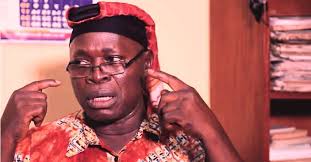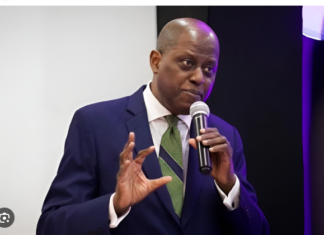By Onyewuchi Ojinnaka
Justice Mohammed Liman of a Federal High Court sitting in Lagos on Tuesday adjourned till March 16, definite hearing on the suit filed by a rights activist and lawyer Malcolm Omirhobo challenging Arabic inscription on the Naira note and the logo on the Nigerian Army flag.
Mr Malcolm Omirhobo had filed the suit in January 2020 challenging continuous Arabic inscription on the Naira and flag of the Army without considering Nigeria as a secular nation.
Joined as defendants to the suit are the Central Bank of Nigeria (CBN); the Nigeria Army; Ministry of Defense and the Attorney General of the Federation (AGF).
Meanwhile, a Professor of Islamic Studies at the Lagos State University, Prof. Ishaq Akintola has asked the Court to join him as a defendant in the suit.
Akintola is seeking to be joined in the suit alongside The Incorporated Trustees of Muslim Rights Concern Association (MURIC).
In his application, Akintola averred that he is the director of MURIC, one of whose aim is to promote the religious, moral and social advancement of its members.
In an affidavit in support of his application for joinder, the Professor averred that the claims contained in the plaintiff’s affidavit are falsehoods and deliberate misrepresentation in respect of Islamic faith and the Arabic language
When the case was called on Tuesday, Mr Omirhobo announced appearance as appearing in person. Mr Adewale Alabi appeared for Akintola and MURIC, Mr Emmanuel Ogunlowo announced appearance for the federal government while Mr Olumuyiwa Aduroja (SAN) appeared for Central Bank of Nigeria.
All counsel did not object to the application for joinder of the parties.
In the suit, Omirhobo (plaintiff) is asking the court to interpret the provisions of Section 10 of the 1999 Constitution of the Federal Republic of Nigeria.
He is seeking a court’s interpretation whether, by a community reading of Sections 10 and 55 of the 1999 Constitution, it is lawful and constitutional for the defendants to permit the Naira notes to be adorned with Arabic inscriptions.
Furthermore, he is asking whether, by a community reading of Sections 1(1)(3), 10 and 55 of the 1999 Constitution, it is proper for the defendants to permit the Nigerian Army logo to be inscribed with the same insignia.
He is seeking a court interpretation whether, by the true letter and spirit of Section 10 of the 1999 Constitution, Nigeria is a secular state without any official religion.
Consequently, he prays the court to declare that it is unconstitutional to allow the Nigerian Army logo to be adorned in the Arabic language, instead of the official English language, Hausa, Yoruba and Igbo which are the three main ethnic groups in Nigeria.
But in his counter-affidavit, Akintola averred that the inscription on the Army logo sounds “Nasiruminallah” which translates in English to mean “victory comes from God alone”
According to the plaintiff, the said inscription does not represent in anyway, the religion of Islam but rather constitutes part of the rich historical heritage of Nigeria, as it dates back to the colonial era and had aided many illiterate Nigerians to know the value of our currencies in Hausa.
He contended that neither the Nigerian constitution nor any statue makes English the official language of the Army, adding that there is also no provision which states that Nigeria is a secular state. He argued that Arabic inscriptions do not render her a secular or non-secular state.
Besides, Akintola argues that the Holy Bible which is the scripture for Christians all over the world is printed in Arabic in countries like Israel, Egypt, Palestine, Lybia, and Syria, adding that church services are also conducted in Arabic in those areas.
He said that the Arabic language is in fact, an indigenous language of the Shuwa Arab ethnic group of Nigeria, and not synonymous with Islam which is the Muslim faith.















